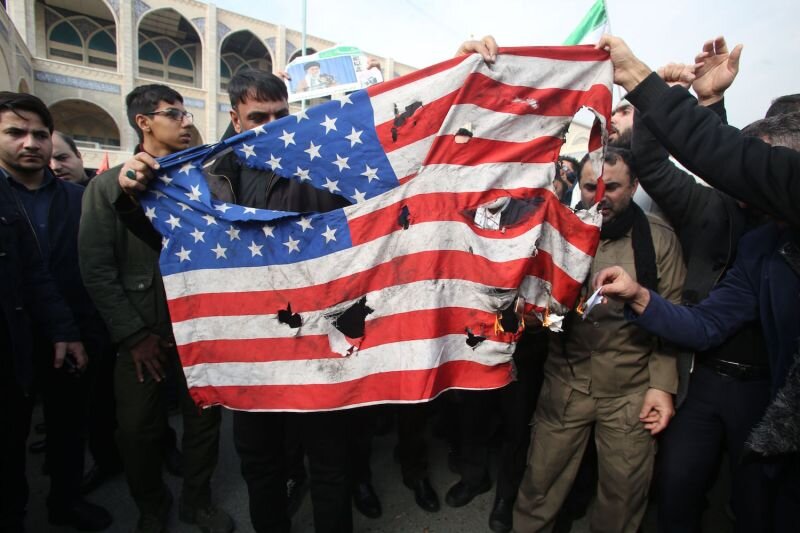Red Line Crossed: U.S. assassination of Qasem Soleimani

“Shahid Soleimani is the international face of the resistance and all who have a heart-felt connection to the resistance seek his blood revenge.” —Leader of the Islamic Revolution Ayatollah Seyed Ali Khamenei
Major General Qasem Soleimani, the Commander of the Quds Forces of the Islamic Revolution Guard Corps (IRGC), was martyred along with Popular Mobilization Forces (PMF) Deputy Commander Abu Mahdi Al Muhandis by a missile attack while leaving Baghdad International Airport on Friday morning, January 3, 2020. Helicopters of the United States forces carried out the criminal assassination ordered by the cowardly Donald Trump, who himself avoided military service during America’s war on Vietnam.
Leader of the Islamic Revolution Ayatollah Seyed Ali Khamenei ordered a three-day mourning period be observed for Martyr Soleimani. Tens of Thousands of Iranians took to the streets in an outpouring of grief and outrage over the slaughter of General Soleimani and Al Muhandis by the warmonging Washington regime, whom Ayatollah Khamenei warned that “severe revenge awaits those criminals who have tainted their filthy hands with his blood and the blood of the other martyrs.” A total of seven individuals were martyred in the brazen U.S. assault, including PMF airport protocol officer, Mohammed Reda. It is possible that the terrorist cult Mujahedin-e Khalq (MeK) was involved in the assassination operation by providing intelligence on the whereabouts of General Soleimani to their U.S. backers. Previously, in June of 2019, the MeK announced that it would welcome the killing of General Soleimani.
The U.S. war department issued a statement on the targeted assassination of Martyr Soleimani and the others in language that demonstrates the cognitive disorder about which Iran’s Foreign Minister, Mohammad Javad Zarif, previously had spoken. The pusillanimous U.S. president had ordered the “decisive defensive action to protect U.S. personnel abroad by killing Qasem Soleimani,” according to a statement by the Pentagon. It would be no exaggeration to call the action by Trump foolhardy. U.S. presidential hopeful Joe Biden called the U.S. targeted killing a “hugely escalatory move” and that Trump had “just tossed a stick of dynamite into a tinderbox.”
Behind the scenes, U.S. secretary of state Michael Pompeo appears to be working more for the interests of Tel Aviv than he is for those of Washington. Earlier in March 2019, Pompeo, after equating anti-Semitism with Zionism in a speech, insisted, “any nation that espouses anti-Zionism, like Iran, must be confronted.” Hence, sanctions against Iran and targeted assassinations of its officials are justified in his Likud-dominated mind. Claiming that Iraqis were “thankful that General Soleimani is no more,” the U.S. secretary of state, who also apparently suffers from a cognitive disorder, pontificated that the assassination was justified because Martyr Soleimani “was actively plotting in the region to take actions—a "big action" as he described it—that would have put dozens if not hundreds of American lives at risk.” In other words, the targeted assassination of Martyr Soleimani and the others disrupted an “imminent” attack against Americans in the Middle East. Of course, Pompeo did not provide details of the alleged Iranian “plot.”
Following unrest in Iran due to fuel price hikes in November 2019, IRGC Commander General Hossein Salami warned the U.S. and the Israeli entity of crossing Iran’s red lines. However, it is not clear at all that the Trump regime understands, or for that matter is capable of understanding just what Iran’s red lines are. Former Pentagon adviser Jasmine El Gamal of the Atlantic Council commented that “it is not clear that this administration — or any administration — understands what Iran’s own red lines are.” By martyring General Soleimani, the U.S. crossed one of Iran’s red lines, according to adviser to Iranian President Hassan Rouhani Hesameddin Ashena. Unfortunately by shredding the JCPOA, Trump has cut off any hope of direct communication with President Rouhani, who emphasized, “The great nation of Iran will take revenge for this heinous crime.”
Before crossing the “Red Line,” the Washington regime would have been well-advised to have studied the 2002 U.S. war game, Millennium Challenge, in which the Blue army representing the U.S. was pitted against the Red army, which represented a “rogue” Middle Eastern country. While the adversary of the U.S. was not specified, it was clear that the intention was Iran, since the scenario centered on regime change and opening shipping lanes in the Persian Gulf. Retired U.S. Marine Corps General Paul Van Riper was called back to lead the Red army against the overwhelming resources of the Blue army. By taking the initiative and using unorthodox tactics—much like those known to be developed and used by Iran—Van Riper managed to turn the tide and emerge victorious, by overloading the Blue army’s Aegis radar system and sinking a total of 19 ships. “The whole thing was over in five, maybe ten minutes,” Van Riper explained. But the wargame controllers refused to accept defeat, and by “refloating” the sunken ships and restricting Van Riper’s winning tactics, managed to create an artificial win for the Blue army.
Did the U.S. learn anything from Millennium Challenge? The answer is an unequivocal no. “Nothing was learned from this,” Van Riper said, adding, “A culture not willing to think hard and test itself does not augur well for the future.” And it is a safe bet that the current regime in Washington holds fast to the culture of being unwilling to think hard about the consequences of crossing other nation’s red lines. The attack causing the martyrdom of General Soleimani acutely demonstrates this point.
Having crossed a red line of the Islamic Republic of Iran, some thoughtful reflection by members of the Trump regime at this time might be well advised, before it’s too late and they are forced to face those in the resistance seeking General Soleimani’s blood revenge.
Leave a Comment